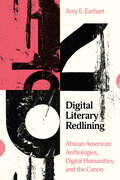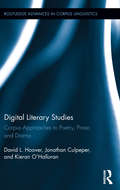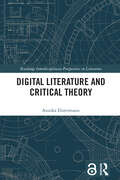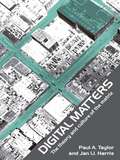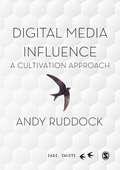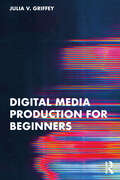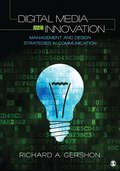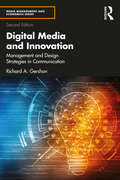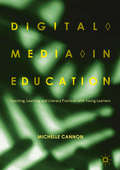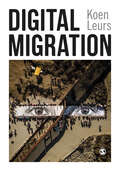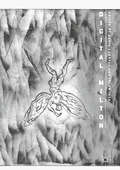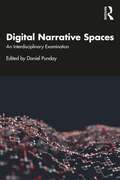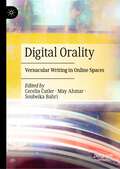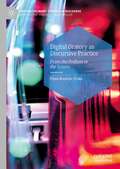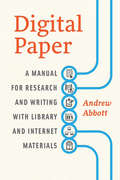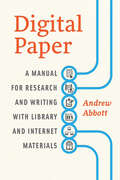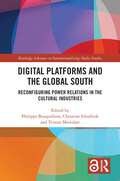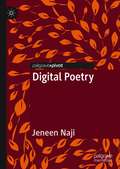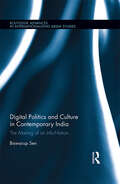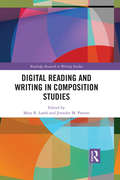- Table View
- List View
Digital Literary Redlining: African American Anthologies, Digital Humanities, and the Canon (Stanford Text Technologies)
by Amy E. EarhartThough canon concerns seem to be a relic of 1990s academia, we are, once again, at a historical moment when there is resistance to teaching texts by writers of color and texts that deal with race, ethnicity and gender. At the same time, algorithmic bias scholars are locating systemic bias encoded into systems from policing software to housing software. Bringing these divergent areas together, Amy E. Earhart examines how technological and institutional infrastructures construct and deconstruct race, ethnicity and gender identities. Focusing on two central infrastructures, the database, a commonly used technological infrastructure in the digital humanities, and the anthology, a scholarly and pedagogical infrastructure, Earhart considers how such seemingly naturalized infrastructures impact the representation and modeling of identity. The book draws upon the building and use of DALA, a collection of almost 100 years of generalist American and African American literature anthologies, constructed to investigate questions of identity and representation in literary anthologies and, by extension, the larger literary canon. The resulting examination, and its rigorous discussion of how identities are created and recreated within Black literary histories, has important implications for contemporary cultural and political debates about canon formation, literary scholarship, and the bias embedded in technological infrastructures.
Digital Literary Studies: Corpus Approaches to Poetry, Prose, and Drama (Routledge Advances in Corpus Linguistics)
by Jonathan Culpeper Kieran O'Halloran David L. HooverDigital Literary Studies presents a broad and varied picture of the promise and potential of methods and approaches that are crucially dependent upon the digital nature of the literary texts it studies and the texts and collections of texts with which they are compared. It focuses on style, diction, characterization, and interpretation of single works and across larger groups of texts, using both huge natural language corpora and smaller, more specialized collections of texts created for specific tasks, and applies statistical techniques used in the narrower confines of authorship attribution to broader stylistic questions. It addresses important issues in each of the three major literary genres, and intentionally applies different techniques and concepts to poetry, prose, and drama. It aims to present a provocative and suggestive sample intended to encourage the application of these and other methods to literary studies. Hoover, Culpeper, and O’Halloran push the methods, techniques, and concepts in new directions, apply them to new groups of texts or to new questions, modify their nature or method of application, and combine them in innovative ways.
Digital Literature and Critical Theory (Routledge Interdisciplinary Perspectives on Literature)
by Annika ElstermannThe aim at the core of this book is a synthesis of increasingly popular and culturally significant forms of digital literature on the one hand, and established literary and critical theory on the other: reading digital texts through the lens of canonical theory, but also reading this more traditional theory through the lens of digital texts and related media. In a field which has often regarded the digital as apart from traditional literature and theory, this book highlights continuities in order to analyse digital literature as part of a longer literary tradition. Using examples from social media to video games and works particularly by postmodern and poststructuralist theorists, Digital Literature and Critical Theory contextualises digital forms among their analogue precursors and traces ongoing social developments which find expression in these cultural phenomena, including power dynamics between authors and readers, the individual in (post-)modernity, consumerism, and the potential for intersubjective exchange.
Digital Matters: The Theory and Culture of the Matrix
by Paul Taylor Jan HarrisAnalyzing the complex interaction between the material and immaterial aspects of new digital technologies, this book draws upon a mix of theoretical approaches (including sociology, media theory, cultural studies and technological philosophy), to suggest that the ‘Matrix’ of science fiction and Hollywood is simply an extreme example of how contemporary technological society enframes and conditions its citizens. Arranged in two parts, the book covers: theorizing the Im/Material Matrix living in the Digital Matrix. Providing a novel perspective on on-going digital developments by using both the work of current thinkers and that of past theorists not normally associated with digital issues, it gives a fresh insight into the roots and causes of the social matrix behind the digital one of popular imagination. The authors highlight the way we should be concerned by the power of the digital to undermine physical reality, but also explore the potential the digital has for alternative, empowering social uses. The book’s central point is to impress upon the reader that the digital does indeed matter. It includes a pessimistic interpretation of technological change, and adds a substantial historical perspective to the often excessively topical focus of much existing cyberstudies literature making it an important volume for students and researchers in this field.
Digital Media Influence: A Cultivation Approach (SAGE Swifts)
by Andy RuddockPopulism, misogyny, rampage murders. Digital media seem to lie at the heart of sinister, intractable social challenges. Curiously, the very societies who fear such things are often dismissive of media research. Addressing key issues affecting global media industries, this book explains how to solve the present conundrum by appreciating the historical development of cultivation theory. Digital Media Influence ties cultivation themes, such as mean world syndrome, mainstreaming, the celebration of white male violence, the ridiculing of ageing women, the inhibition of activism, the mediatisation of religion and the erosion of trust in education, with contemporary digital media case studies. Considering the aftermath of the Parkland murders, political memes, Islamophobia, the fate of female reality TV stars and the bad press directed at media education, Ruddock shows how these phenomena are born of media practices that cultivation theory began to dissect in the 1950s. Paying close attention to the life and work of George Gerbner, Digital Media Influence locates today’s questions in the historical forces and relationships that moved media industries closer to the heart of global politics in the mid-20th century. It makes Gerbner’s work relevant to all critical media researchers by providing a theoretical, methodological and historical steer for understanding new media influences. In explaining how one of the world’s leading media theories developed in relation to intriguing historical circumstances – many of them deeply personal – this book helps researchers of all levels to find their voice in writing on media issues.
Digital Media Influence: A Cultivation Approach (SAGE Swifts)
by Andy RuddockPopulism, misogyny, rampage murders. Digital media seem to lie at the heart of sinister, intractable social challenges. Curiously, the very societies who fear such things are often dismissive of media research. Addressing key issues affecting global media industries, this book explains how to solve the present conundrum by appreciating the historical development of cultivation theory. Digital Media Influence ties cultivation themes, such as mean world syndrome, mainstreaming, the celebration of white male violence, the ridiculing of ageing women, the inhibition of activism, the mediatisation of religion and the erosion of trust in education, with contemporary digital media case studies. Considering the aftermath of the Parkland murders, political memes, Islamophobia, the fate of female reality TV stars and the bad press directed at media education, Ruddock shows how these phenomena are born of media practices that cultivation theory began to dissect in the 1950s. Paying close attention to the life and work of George Gerbner, Digital Media Influence locates today’s questions in the historical forces and relationships that moved media industries closer to the heart of global politics in the mid-20th century. It makes Gerbner’s work relevant to all critical media researchers by providing a theoretical, methodological and historical steer for understanding new media influences. In explaining how one of the world’s leading media theories developed in relation to intriguing historical circumstances – many of them deeply personal – this book helps researchers of all levels to find their voice in writing on media issues.
Digital Media Production for Beginners
by Julia V. GriffeyWritten for the non-specialist media producer, this book offers a practical and engaging guide to basic digital media production using modern equipment and software.As media production tools and software become more pervasive and traditional media jobs scarcer, today’s media professionals are now expected to be content creators across multiple forms of media, often working with little more equipment than a smartphone. In this accessible manual, Griffey explains how well-crafted media can help sell products, bolster subscriptions, and influence public opinion—and how to go about crafting it in a landscape of high-speed social media consumption. Topics covered include the basics of photography, film, video, and audio production, as well as animation and building websites. Readers will learn not just how to shoot or record content, but also how to edit, compress, and share it, considering the most appropriate file types, equipment, software, and platforms to use for each scenario. After reading this book, students will understand best practices associated with almost every area of media production and possess the essential skills to get the job done.This book is an essential companion for students in communication disciplines, including PR, advertising, journalism, and marketing, looking for a solid grounding in digital media production to prepare them for the competitive job market.
Digital Media and Innovation: Management and Design Strategies in Communication
by Dr Richard A. GershonDigital Media and Innovation, by Richard A. Gershon, takes an in-depth look at how smart, creative companies have transformed the business of media and telecommunications by introducing unique and original products and services. Today's media managers are faced with the same basic question: what are the best methods for staying competitive over time? In one word: innovation. From electronic commerce (Amazon, Google) to music and video streaming (Apple, Pandora, and Netflix), digital media has transformed the business of retail selling and personal lifestyle. This text will introduce current and future media industry professionals to the people, companies, and strategies that have proven to be real game changers by offering the marketplace a unique value proposition for the consumer.
Digital Media and Innovation: Management and Design Strategies in Communication
by Dr Richard A. GershonDigital Media and Innovation, by Richard A. Gershon, takes an in-depth look at how smart, creative companies have transformed the business of media and telecommunications by introducing unique and original products and services. Today's media managers are faced with the same basic question: what are the best methods for staying competitive over time? In one word: innovation. From electronic commerce (Amazon, Google) to music and video streaming (Apple, Pandora, and Netflix), digital media has transformed the business of retail selling and personal lifestyle. This text will introduce current and future media industry professionals to the people, companies, and strategies that have proven to be real game changers by offering the marketplace a unique value proposition for the consumer.
Digital Media and Innovation: Management and Design Strategies in Communication (Media Management and Economics Series)
by Richard A. GershonThis fully updated second edition explores the importance of innovation and innovative thinking for the long-term success of today’s leading media, telecommunications, and information technology companies.The book takes an in-depth look at how smart, creative companies have transformed today's digital economy by introducing unique and highly differentiated products and services. This edition provides a detailed overview of intelligent networks and analyzes disruptive business models and processes from companies involved in social media, artificial intelligence, the metaverse, smart cities, and robotics among other emerging areas. From Apple to Zoom, this book considers some of the key people, companies, and strategies that have transformed the communication industries. Exploring the power of good ideas, this book goes inside the creative edge and looks at what makes such companies successful over time.Digital Media and Innovation is suited to advanced undergraduate and graduate courses in media management, media industries, communication technology, and business management and innovation, and provides up-to-date research for media and business professionals.
Digital Media and Risk Culture in China’s Financial Markets (Routledge Research in Digital Media and Culture in Asia)
by Zhifei MaoThis book analyzes the risk cultures in China that have emerged from the entanglement of new communication technologies and financial markets, examining the role that digital media play in Asian modernity and offering an alternative narrative to that of the West. The book illustrates the impact of exclusively Chinese digital media on power dynamics within risk definition, arguing that information and communication technologies (ICTs) empower individuals, enabling them to compete with an expert-oriented risk culture controlled by Government- and banker-led media outlets. With struggles, competitions, compromises, and confrontations, major communicators in financial world are collectively producing risk cultures based on interpersonal relations instead of contractual obligations, in which insider information is valued over professional analysis. Meanwhile, investors are trapped in a risk culture paradox that they themselves have produced, as they attempt to take advantage of other actors’ uncertainties and eventually produce risks for the entire market.
Digital Media in Education: Teaching, Learning and Literacy Practices with Young Learners
by Michelle CannonThis book argues for dynamic and relevant school experiences for primary and early secondary learners that embed digital media production. It proposes a vision of literacy that combines new technologies with multiple modes of meaning-making. Drawing on theories related to cultural studies, media literacy, anthropology, and creativity, the author explores learning strategies with digital media based on an empowering, values-driven framework. The book advances innovative teaching methods, critiquing educational ‘reforms’ that marginalise media and fail to engage with the complex tensions and textures of modern pedagogy. Positioning film and media-making as vital practices in schools that nurture the skills, dispositions and competencies of modern literacy, the model foregrounds connections between human agency, cognition, and creative practice. This innovative book will appeal to students and scholars of creativity, digital media production, primary education and literacy.
Digital Migration
by Koen Leurs"A revelation for digital researchers and a provocation for migration scholars… It introduces an insightful, inspiring, and inviting way of making sense of the messiness without losing hope of changing things." - Nishant Shah, Chinese University of Hong Kong "A must read for everyone who is concerned with questions of human mobility, media and communications and the digital border." - Myria Georgiou, LSE "A much-needed addition to scholarship on mobility, technology, and migration… The book is poised to become a touchstone text." - C.L. Quinan University of Melbourne In contemporary discussions on migration, digital technology is often seen as a ′smart′ disruptive tool. Bringing efficiencies to management, and safety to migrants. But the reality is always more complex. This book is a comprehensive and impassioned account of the relationship between digital technology and migration. From ′top-down′ governmental and corporate shaping of the migrant condition, to the ′bottom-up′ of digital practices helping migrants connect, engage and resist. Taking an interdisciplinary approach, Digital Migration explores: The power relations of digital infrastructures across migrant recruitment, transportation and communication. Migrant connections and the use of digital devices, platforms and networks. Dominant digital representations of migrants, and how they’re resisted. The affect and emotion of digital migration, from digital intimacy to transnational family life. How histories of pre and early-digital migration help us situate and rethink contemporary research. The realities of researching digital migration, including interviews with leading international researchers. Critical yet hopeful, Koen Leurs opens up the unequal power relations at the heart of digital migration studies, challenging us to imagine more just alternatives. Koen Leurs is an Associate Professor in Gender, Media and Migration Studies at the Graduate Gender Program, Department of Media and Culture, Utrecht University, the Netherlands. All author royalties for this book will be donated to the Alarm Phone, a hotline for boatpeople in distress.
Digital Migration
by Koen Leurs"A revelation for digital researchers and a provocation for migration scholars… It introduces an insightful, inspiring, and inviting way of making sense of the messiness without losing hope of changing things." - Nishant Shah, Chinese University of Hong Kong "A must read for everyone who is concerned with questions of human mobility, media and communications and the digital border." - Myria Georgiou, LSE "A much-needed addition to scholarship on mobility, technology, and migration… The book is poised to become a touchstone text." - C.L. Quinan University of Melbourne In contemporary discussions on migration, digital technology is often seen as a ′smart′ disruptive tool. Bringing efficiencies to management, and safety to migrants. But the reality is always more complex. This book is a comprehensive and impassioned account of the relationship between digital technology and migration. From ′top-down′ governmental and corporate shaping of the migrant condition, to the ′bottom-up′ of digital practices helping migrants connect, engage and resist. Taking an interdisciplinary approach, Digital Migration explores: The power relations of digital infrastructures across migrant recruitment, transportation and communication. Migrant connections and the use of digital devices, platforms and networks. Dominant digital representations of migrants, and how they’re resisted. The affect and emotion of digital migration, from digital intimacy to transnational family life. How histories of pre and early-digital migration help us situate and rethink contemporary research. The realities of researching digital migration, including interviews with leading international researchers. Critical yet hopeful, Koen Leurs opens up the unequal power relations at the heart of digital migration studies, challenging us to imagine more just alternatives. Koen Leurs is an Associate Professor in Gender, Media and Migration Studies at the Graduate Gender Program, Department of Media and Culture, Utrecht University, the Netherlands. All author royalties for this book will be donated to the Alarm Phone, a hotline for boatpeople in distress.
Digital Milton
by David Currell Islam IssaDigital Milton is the first volume to investigate John Milton in terms of our digital present. It explores the digital environments Milton now inhabits as well as the diverse digital methods that inform how we read, teach, edit, and analyze his works. Some chapters use innovative techniques, such as processing metadata from vast archives of early modern prose, coding Milton’s geographical references on maps, and visualizing debt networks from literature and from life. Other chapters discuss the technologies and platforms shaping how literature reaches us today, from audiobooks to eReaders, from the OED Online to Wikipedia, and from Twitter to YouTube. Digital Milton is the first say on a topic that will become ever more important to scholars, students, and teachers of early modern literature in the years to come.
Digital Narrative Spaces: An Interdisciplinary Examination
by Daniel PundayThere is a broad consensus that digital narrative is "spatial," but what this critical term means and how it is used varies greatly depending on the discipline from which it is approached. Digital Narrative Spaces brings together essays by prominent scholars in electronic literature and other forms of digital authorship to explore the relationship between story and space across these disciplines. This volume includes an introduction with Marie-Laure Ryan’s typology of space, followed by thought-provoking individual chapters which explore innovative explorations of electronic literature, locative media, literary tourism, and the mapping of real-world literary spaces. The collection closes with an essay analyzing continuities and discontinuities in theory of space across the chapters. This volume will provide an important framework for establishing a dialogue across disciplines and future scholarship in these fields.
Digital Orality: Vernacular Writing in Online Spaces
by Cecelia Cutler May Ahmar Soubeika BahriThis volume showcases innovative research on dialectal, vernacular, and other forms of “oral,” speech-like writing in digital spaces. The shift from a predominantly print culture to a digital culture is shaping people's identities and relationships to one another in important ways. Using examples from distinct international contexts and language varieties (kiAmu, Lebanese, Ettounsi, Shanghai Wu, Welsh English, and varieties of American English) the authors examine how people use unexpected codes, scripts, and spellings to say something about who they are or aspire to be. This book will be of particular interest to students and scholars interested in the impact of social media on language use, style, and orthography, as well as those with a broader interest in literacy, communication, language contact, and language change.
Digital Oratory as Discursive Practice: From the Podium to the Screen (Postdisciplinary Studies in Discourse)
by Fiona Rossette-CrakeThis book offers an appraisal of oratory, old and new, relating former discourse practice to a specific sub-set of contemporary, digital practices. The author explores the interface between language and society, providing an interdisciplinary study at the crossroads of discourse, linguistics, communication and rhetoric. The comparisons she draws are particularly pertinent in light of the steep rise in presentations given during video-conferences, webinars, and other online events during the COVID-19 pandemic, an event which accelerated previous moves towards digital communication and which is likely to have a long-term impact on communication styles. This book will be of interest to academics and students in fields including discourse analysis, applied linguistics, communication studies, digital studies and business studies.
Digital Paper: A Manual for Research and Writing with Library and Internet Materials
by Andrew AbbottToday’s researchers have access to more information than ever before. Yet the new material is both overwhelming in quantity and variable in quality. How can scholars survive these twin problems and produce groundbreaking research using the physical and electronic resources available in the modern university research library? In Digital Paper, Andrew Abbott provides some much-needed answers to that question. Abbott tells what every senior researcher knows: that research is not a mechanical, linear process, but a thoughtful and adventurous journey through a nonlinear world He breaks library research down into seven basic and simultaneous tasks: design, search, scanning/browsing, reading, analyzing, filing, and writing. He moves the reader through the phases of research, from confusion to organization, from vague idea to polished result. He teaches how to evaluate data and prior research; how to follow a trail to elusive treasures; how to organize a project; when to start over; when to ask for help. He shows how an understanding of scholarly values, a commitment to hard work, and the flexibility to change direction combine to enable the researcher to turn a daunting mass of found material into an effective paper or thesis. More than a mere how-to manual, Abbott’s guidebook helps teach good habits for acquiring knowledge, the foundation of knowledge worth knowing. Those looking for ten easy steps to a perfect paper may want to look elsewhere. But serious scholars, who want their work to stand the test of time, will appreciate Abbott’s unique, forthright approach and relish every page of Digital Paper.
Digital Paper: A Manual for Research and Writing with Library and Internet Materials (Chicago Guides to Writing, Editing, and Publishing)
by Andrew AbbottToday’s researchers have access to more information than ever before. Yet the new material is both overwhelming in quantity and variable in quality. How can scholars survive these twin problems and produce groundbreaking research using the physical and electronic resources available in the modern university research library? In Digital Paper, Andrew Abbott provides some much-needed answers to that question. Abbott tells what every senior researcher knows: that research is not a mechanical, linear process, but a thoughtful and adventurous journey through a nonlinear world. He breaks library research down into seven basic and simultaneous tasks: design, search, scanning/browsing, reading, analyzing, filing, and writing. He moves the reader through the phases of research, from confusion to organization, from vague idea to polished result. He teaches how to evaluate data and prior research; how to follow a trail to elusive treasures; how to organize a project; when to start over; when to ask for help. He shows how an understanding of scholarly values, a commitment to hard work, and the flexibility to change direction combine to enable the researcher to turn a daunting mass of found material into an effective paper or thesis. More than a mere how-to manual, Abbott’s guidebook helps teach good habits for acquiring knowledge, the foundation of knowledge worth knowing. Those looking for ten easy steps to a perfect paper may want to look elsewhere. But serious scholars, who want their work to stand the test of time, will appreciate Abbott’s unique, forthright approach and relish every page of Digital Paper.
Digital Platforms and the Global South: Reconfiguring Power Relations in the Cultural Industries (Routledge Advances in Internationalizing Media Studies)
by Christine Ithurbide Tristan MattelartThis book addresses the issues raised by digital platforms in the Global South, with an emphasis on the cultural stakes involved. It brings together an interdisciplinary team of researchers – including political economists, socio-economists, geographers, media sociologists or anthropologists – who each explore these issues through an insightful case study at a local, national, regional or international scale. While studying the strategies of some of the main US-based Big Tech platforms or video streaming platforms towards the Global South, the chapters also consider the often-neglected active role local or regional actors play in the expansion of those Western digital players, and highlight the existence of a constellation of local or regional platforms that have emerged in Africa, Asia, Latin America or the Middle East. In addition to analysing the complex relationships of competition, collaboration or dependence between these diverse actors, this volume examines the ways in which the rise of these digital platforms has generated new forms of cultural entrepreneurship and participated in the reconfiguring of the conditions in which cultural contents are produced and circulated in the Global South. This volume will appeal to readers interested in the transnationalisation of cultural industries or in the social, political, economic, cultural and geopolitical dimensions of digital transformations and will be an important resource for students, teachers and researchers in media, communication, cultural studies, international relations and area studies programmes.
Digital Platforms and the Global South: Reconfiguring Power Relations in the Cultural Industries (Routledge Advances in Internationalizing Media Studies)
by Philippe Bouquillion Christine IthurbideThis book addresses the issues raised by digital platforms in the Global South, with an emphasis on the cultural stakes involved.It brings together an interdisciplinary team of researchers – including political economists, socio-economists, geographers, media sociologists or anthropologists – who each explore these issues through an insightful case study at a local, national, regional or international scale. While studying the strategies of some of the main US-based Big Tech platforms or video streaming platforms towards the Global South, the chapters also consider the often-neglected active role local or regional actors play in the expansion of those Western digital players, and highlight the existence of a constellation of local or regional platforms that have emerged in Africa, Asia, Latin America or the Middle East. In addition to analysing the complex relationships of competition, collaboration or dependence between these diverse actors, this volume examines the ways in which the rise of these digital platforms has generated new forms of cultural entrepreneurship and participated in the reconfiguring of the conditions in which cultural contents are produced and circulated in the Global South.This volume will appeal to readers interested in the transnationalisation of cultural industries or in the social, political, economic, cultural and geopolitical dimensions of digital transformations and will be an important resource for students, teachers and researchers in media, communication, cultural studies, international relations and area studies programmes.The Open Access version of this book, available at http://www.taylorfrancis.com, has been made available under a Creative Commons [Attribution-Non Commercial-No Derivatives (CC-BY-NC-ND)] 4.0 license.
Digital Poetry
by Jeneen NajiThis book examines contemporary forms of digital poetry in emerging technologies such as drones, machine learning, Instagram, virtual reality and mobile devices. Theoretical frameworks that engage with posthumanism, multimodality, hermeneutics and eco-writing are used to examine the changing shape of the literary artefact in the second age of machines. The book contextualises the necessity of a multidisciplinary approach for a complex artefact and gives a broad overview of the field and history of digital poetry as a subset of the genre of electronic literature. Naji examines Instapoetry and the literary algorithm, haptic hermeneutics and poetry apps. The discussion also engages with eco-writing and drone poetry, poetic mirror worlds, and mixed reality poetry, concluding with an examination of the future of poetics and literary expression in the second age of machines.
Digital Politics and Culture in Contemporary India: The Making of an Info-Nation (Routledge Advances in Internationalizing Media Studies)
by Biswarup SenThe relationship between information and the nation-state is typically portrayed as a face-off involving repressive state power and democratic flows: Twitter and the Arab Spring, Google in China, WikiLeaks and the U.S. State Department. Less attention has been paid to those scenarios where states have regarded information and its diffusion as productive of modernity and globalization. It is the central argument of this book that the contemporary nation-state, especially in the global South, is far from hostile to the current informational milieu and in fact makes crucial use of it in order to develop adequate modes of governance, communication and sociality in a networked world. This book focuses on India – an emerging country that has recently witnessed a "software miracle" – to highlight the critical role informatics has historically played in the national imagination and to demonstrate how the state, private capital and civic society have drawn upon and engaged the precepts and protocols of the information age to fashion an "info-nation."
Digital Reading and Writing in Composition Studies (Routledge Research in Writing Studies)
by Mary R. Lamb Jennifer M. ParrottAs digital reading has become more productive and active, the lines between reading and writing become more blurred. This book offers both an exploration of collaborative reading and pedagogical strategies for teaching reading and writing that reflect the realities of digital literacies. This edited scholarly collection offers strategies for teaching reading and writing that highlight the possibilities, opportunities, and complexities of digital literacies. Part 1 explores reading and writing that happen digitally and offers frameworks for thinking about this process. Part 2 focuses on strategies for the classroom by applying reading theories, design principles, and rhetorical concepts to instruction. Part 3 introduces various disciplinary implications for this blended approach to writing instruction. What is emerging is new theories and practices of reading in both print and digital spaces—theories that account for how diverse student readers encounter and engage digital texts. This collection contributes to this work by offering strategies for sustaining reading and cultivating writing in this landscape of changing digital literacies. The book is essential for the professional development of beginning teachers, who will appreciate the historical and bibliographic overview as well as classroom strategies, and for busy veteran teachers, who will gain updated knowledge and a renewed commitment to teaching an array of literacy skills. It will be ideal for graduate seminars in composition theory and pedagogy, both undergraduate and graduate; and teacher education courses, and will be key reading for scholars in rhetoric and composition interested in composition history, assessment, communication studies, and literature pedagogy.
